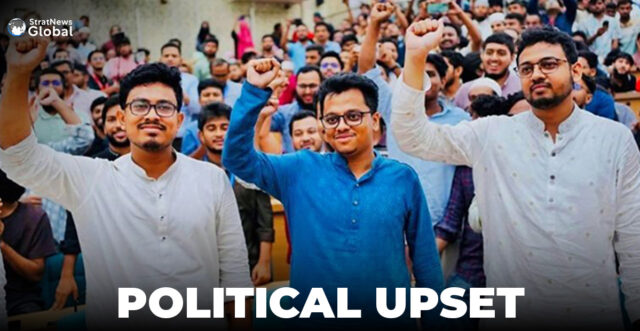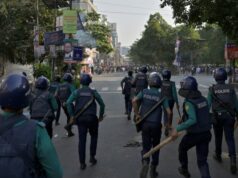In a stunning comeback, the student wing of Bangladesh’s Islamist political party Jamaat-e-Islami has clinched a landslide victory in the Dhaka University Central Students’ Union (DUCSU) elections.
The results, seen as politically significant, come just months ahead of the February 2026 national polls, media reports said.
First Polls Since Hasina’s Ouster
The Islami Chhatra Shibir (ICS)-backed panel secured 23 of 28 seats, defeating the student wing of former Prime Minister Khaleda Zia’s Bangladesh Nationalist Party (BNP).
Key winners include Shadik Kayem and SM Farhad, elected Vice-President and General Secretary respectively, while Muhammad Mohiuddin Khan was elected Assistant General Secretary. Under DUCSU rules, the Vice-President automatically assumes the role of President.
A total of 471 candidates contested for the 28 posts, with ICS running a full panel.
This was the first DUCSU election under the interim government and notably the first without participation from the Bangladesh Chhatra League (the Awami League’s student wing), which was banned earlier.
Back To ‘Hijab’ Era
Reacting to ICS’ victory, exiled author Taslima Nasreen shared a video on Facebook, warning that some of the student wing members were already calling for hijab enforcement.
In the video caption, she wrote: “In the DUCSU election, these jihadis who won are shouting ‘Hijab, hijab’. Surely, the female students who do not wear hijab will be harassed by these …….. in many ways. After forcing women into hijab, they will start shouting ‘Burqa, burqa’. Then women will have to go to university wearing the burqa. After that, they will, in Taliban style, start saying that women should not study at university. ”
“They will shout ‘No female students, no female students.’ Next, they will oppose women studying in schools and colleges. They will demand that women should not be seen in workplaces, shouting ‘No women, no women’. Then they will demand that women should not go outside the home at all. The country is falling into the hands of rapists and misogynists, ignorant, violent men and extremists,” she wrote.
Implications
For the first time in decades, DUCSU will be dominated by Shibir, which had been sidelined for years. This could reshape the nature of protests and policy debates at the university.
In national politics, Jamaat-e-Islami may regain political influence through its student front, while BNP’s weak showing underscores its struggle to fully capture youth support.
The result signals growing student disillusionment with both the Awami League and BNP, potentially forcing larger parties to recalibrate their youth engagement strategies.
Secular student groups have warned that Shibir’s control could accelerate campus radicalisation. International observers, meanwhile, are watching closely, given how student politics in Bangladesh often reflect broader national trends.
(With inputs from IBNS)





